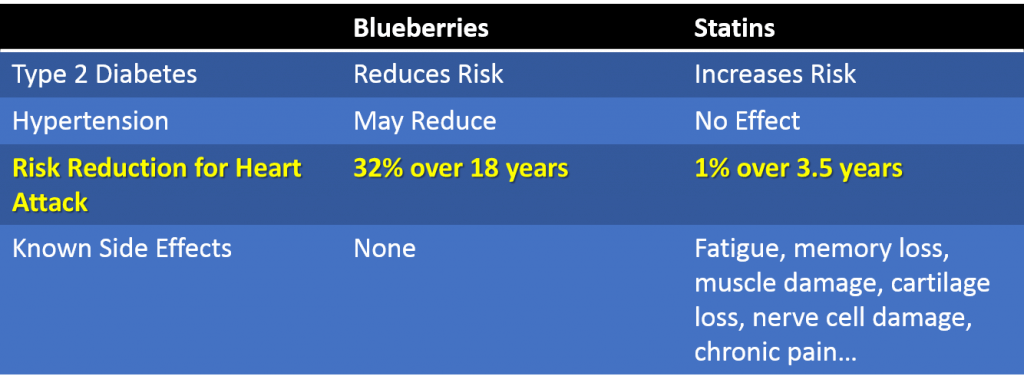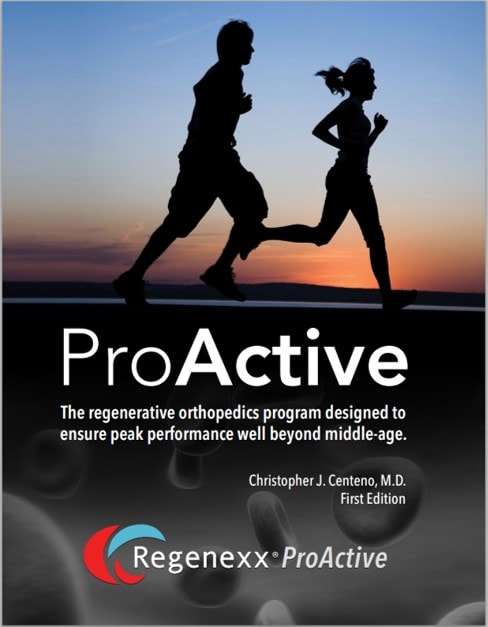Blueberries May Protect Your Heart!
What foods can you add to your diet right now to improve heart health? We all know we can take a magic pill, but did you know you can add simple foods like blueberries or chocolate? Let’s explore blueberries, as these will definitely tempt you at the grocery store sometime this summer.
Blueberries vs. Cholesterol Meds
I blogged about blueberries and heart disease many years ago, and produced this table that summarized the research:

As you can see, in this study, blueberries smoked standard cholesterol-lowering drugs for their impact on reducing heart attacks.
Blueberries as Medication
The number of items claiming their spot on the list of “superfoods” is ever-growing. Some of these are easy to get excited about eating; others, not so much. Berries are usually included somewhere in the lineup on these super lists but blueberries, as the result of a new study, are now toward the very top.
Last week, researchers at the University of East Anglia published a study showing that eating a cup of these juicy nuggets per day can improve heart health by as much as 15%, even in those who are already at risk for disease.
Previous studies had shown that berry-rich diets have a positive effect on both the brain and heart, but this newest research was unique and the findings more compelling in several ways:
- Only blueberries were studied; and, in specific amounts
- Only people who had metabolic syndrome were included in the study
- The study lasted six months; significantly longer than any prior antioxidant research
What is Metabolic Syndrome?
The researchers completing this study looked at people who were already at risk for heart disease due to a condition known as metabolic syndrome. When a person has three or more of five specific health conditions (known as metabolic risk factors) that increase the risk for heart disease, diabetes, or stroke, they are diagnosed with metabolic syndrome. These metabolic risk factors are:
- Abdominal obesity: Having a large waistline or being shaped like an apple
- Low HDL cholesterol levels (or you take medication to raise your levels): This is the “good” type of cholesterol
- High triglyceride levels (or you take medication to lower your levels): This is a type of fat in the blood
- High blood sugar (fasting) levels (or you take medication to lower your blood sugar levels): Abnormal blood sugar levels can indicate diabetes
- Hypertension (or you take medication to control your blood pressure): Persistently high blood pressure can damage blood vessels and leads to heart disease
What Can You Do Right Now?
Skip that cake or pie for dessert and instead, have a cup of blueberries. If you can’t eat a cup of blueberries because they’re not sweet enough, you have a serious condition that I call sugar poisoning (like many Americans). You need to read this book to figure out how to get off the train to an early death caused by eating far too much sugar:
The upshot? Blueberries are clearly a superfood that can protect your heart. If you don’t like plain blueberries because they’re just not sweet enough, then you really need to read my ProActive book above, as that’s a very bad sign of more serious problems to come.

NOTE: This blog post provides general information to help the reader better understand regenerative medicine, musculoskeletal health, and related subjects. All content provided in this blog, website, or any linked materials, including text, graphics, images, patient profiles, outcomes, and information, are not intended and should not be considered or used as a substitute for medical advice, diagnosis, or treatment. Please always consult with a professional and certified healthcare provider to discuss if a treatment is right for you.

